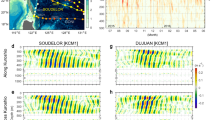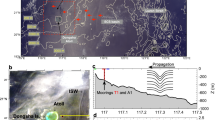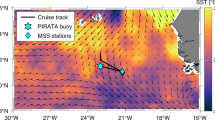Abstract
Wave breaking is believed to be important in air–sea interaction. Laboratory measurements1 suggest that the momentum flux from the atmosphere to the ocean may be significantly enhanced by breaking and recent field measurements2–4 have demonstrated the important role of breaking in bubble generation and gas transfer. It has long been speculated that the loss of momentum flux from the wave field due to breaking could act as a source of momentum for current generation5 and Mitsuyasu6 has drawn attention to the large discrepancy between the momentum flux from the wind and that carried by the waves, suggesting that the loss may be due to wave breaking. Here we present what we believe are the first well-controlled laboratory measurements of the momentum flux lost by wave breaking. These measurements are consistent with Mitsuyasu's hypothesis and recent measurements of wave growth, and support the conclusion that wave breaking plays an important role in momentum transfer across the air–sea interface.
This is a preview of subscription content, access via your institution
Access options
Subscribe to this journal
Receive 51 print issues and online access
$199.00 per year
only $3.90 per issue
Buy this article
- Purchase on Springer Link
- Instant access to full article PDF
Prices may be subject to local taxes which are calculated during checkout
Similar content being viewed by others
References
Banner, M. L. & Melville, W. K. J. Fluid Mech. 77, 825–842 (1976).
Thorpe, S. A. & Stubbs, A. R. Nature 279, 403–405 (1979).
Thorpe, S. A. & Humphries, P. N. Nature 283, 463–465 (1980).
Thorpe, S. A. Phil. Trans. R. Soc. A304, 155–210 (1982).
Longuet-Higgins, M. S. in 10th Symp. Naval Hydrodynamics, 597–605, ONR, Arlington, Virginia (US Government Printing Office, 1976); in Turbulent Fluxes through the Sea Surface, Wave Dynamics, and Prediction, (eds Favre, A. & Hasselmann, K.) 199–220 (Plenum, New York, 1978).
Mitsuyasu, H. J. geophys. Res. 90, 3343–3345 (1985).
Longuet-Higgins, M. S. & Cokelet, E. D. Proc. R. Soc. A350, 1–25 (1976).
Melville, W. K. J. Fluid Mech. 115, 165–185 (1982).
Banner, M. L. & Phillips, O. M. J. Fluid Mech. 65, 647–656 (1974).
Donelan, M., Longuet-Higgins, M. S. & Turner, J. S. Nature 239, 449–451 (1972).
Melville, W. K., Rapp, R. J. & Chan, E. S. . in The Ocean Surface: Wave Breaking, Turbulent Mixing and Radio Probing 413–418 (Reidel, Dordrecht, 1985).
Whitham, G. B. Linear and Nonlinear Waves (Wiley, New York, 1974).
Plant, W. J. J. Geophys. Res. 87, 1661–1667 (1982).
Wu, J. J. geophys. Res. 87, 9704–9706 (1982).
Author information
Authors and Affiliations
Rights and permissions
About this article
Cite this article
Melville, W., Rapp, R. Momentum flux in breaking waves. Nature 317, 514–516 (1985). https://doi.org/10.1038/317514a0
Received:
Accepted:
Published:
Issue Date:
DOI: https://doi.org/10.1038/317514a0
This article is cited by
-
Nonlinear wave evolution with data-driven breaking
Nature Communications (2022)
-
Wave breaking and bubble formation associate energy dissipation and wave setup
Ocean Dynamics (2019)
-
The effects of surfactants on spilling breaking waves
Nature (2003)
-
Distribution of breaking waves at the ocean surface
Nature (2002)
-
Infrared remote sensing of breaking waves
Nature (1997)
Comments
By submitting a comment you agree to abide by our Terms and Community Guidelines. If you find something abusive or that does not comply with our terms or guidelines please flag it as inappropriate.



